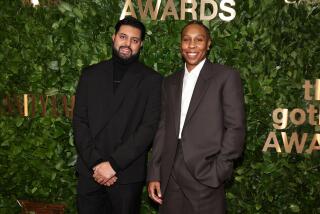Want to fix the racial disparity in book advances? Pay assistants more

NEW YORK CITY — In late 2013, when I was working as the editorial director of digital content at Barnes & Noble’s Nook, I flew to Palo Alto, Calif., to meet with the tech team and give a presentation on how deal-making in publishing works.
“Well, it’s mostly a gut feeling,” I said of the process of making an offer on a book, to audible gasps from my colleagues. Members of the Silicon Valley team, part of an economic sector swimming in data, were perplexed when I told them how analog publishing remains — that there is no formula for choosing a book to acquire or for arriving at an advance on royalties, the payment an author receives on signing a contract. Guessing, I told my bewildered audience, is our best practice.
I thought of my 2013 trip last week when author LL McKinney brought to light inequities in book publishing with the Twitter hashtag #PublishingPaidMe, an effort to make advance figures more transparent and to “highlight the problem of what Black authors are paid vs non-Black authors.”
On Twitter and in a related public spreadsheet, some surprisingly low advances for Black authors were revealed: Two-time National Book Award winner Jesmyn Ward tweeted that she barely earned a six-figure advance on her most recent novel, compared to the $1.3 million reportedly given to Jeanine Cummins, the white author of the Mexican refugee melodrama “American Dirt.”
Genre writers tend to get even lower advances than their more generalist kin. Most notably, N.K. Jemisin, a hugely popular, three-time Hugo Award-winning author of the “Broken Earth” trilogy, revealed that she received only $25,000 in advances for each book in her beloved series. Jemisin’s publisher, Orbit Books, points out that she’s received “substantial royalty checks” since her advances have earned out.
At the high end, it’s more likely that a debut author who gets a six-figure book deal will be white. White novelist Chip Cheek tweeted that he was paid an $800,000 advance for his debut.
The data in the #PublishingPaidMe spreadsheet is heavily skewed because only white authors were explicitly asked to share their advances; they make up 70% of the respondents. We can’t make too many conclusions based only on these 2,700 submissions (most of them anonymous), but the qualitative data are still telling.
Unequal advances are the symptom of a larger problem, and that larger problem is the lack of racial diversity in book publishing. A 2019 diversity baseline survey commissioned by children’s book publisher Lee & Low found that 76% of respondents were white, while only 5% were Black and 3% were biracial/multiracial. The most racially diverse stratum of publishing was the entry level, while the executive tier remains 78% white. If the decision-makers in publishing are overwhelmingly white and their decisions amount to subjective guesswork, then racism, no matter how unintentional, will be institutional.
Implicit bias, as Jenée Desmond-Harris writes in a 2014 Vox explainer, “describes what’s happening when, despite our best intentions and without our awareness, racial stereotypes and assumptions creep into our minds and affect our actions.” Implicit bias is a flash point across many industries, including tech — which likes to think itself insulated from subjectivity by the analytics used in the hiring process. Yet studies have found bias even in its hiring algorithms.
If the illusion of objectivity is tech’s problem to solve, the issue in publishing is just as pernicious: an underlying decision structure that to outsiders feels both hidebound and shockingly arbitrary from start to finish. “There are so many intangibles in publishing, so many vagaries and variables,” author Carmen Maria Machado tweeted in response to #PublishingPaidMe, “that so much of one’s individual success comes down to the whims and hunches of other people.” Such vagaries arise in book advances because it’s nearly impossible to predict how much a particular book will sell. Editors are left with only a few imperfect tools at their disposal to make “educated” guesses.
Among those are so-called comp titles — similar (“comparative”) books already on the market that in the absence of real predictive data stand in as models for a forthcoming publication. Risk-averse publishers love books that are similar to other books that have sold well, which is why after the surprise success of “50 Shades of Grey” there were so many knockoff romances featuring young women who fall in love with controlling billionaires. It’s much more difficult to quantify success when a book does something unique, which is why publishing tends to punish, rather than reward, truly innovative authors.
Editors must also fill out profit and loss statements to justify their advances. The P&L contains fixed costs (including overhead and manufacturing), and the editor’s job is to plug in the advance they would like to offer and determine how many copies the book would have to sell to justify it. Fudging P&Ls is a publishing tradition as old as getting drunk at book parties.
Once the editor has filled out a P&L, the editorial director or the publisher (with input from sales and marketing teams) then decides whether the numbers will work. The guesses that editors and publishers make are loaded with their own assumptions: An editor who is persuasive or powerful can swing into the office raving about a manuscript so addictive that “I missed my subway stop,” and within a couple of days the entire publishing team has “fallen in love with it.” Up goes the price. Or the book might be one that many publishers are trying to buy, and if it goes to auction, the advance will be driven up by competition.
If subjectivity is inevitably baked into book publishing, then it’s important that the decision-makers bring to their educated guesses a diversity of experience. Employers should be more aggressive about retaining those more diverse entry-level employees so they get a chance to advance into positions of real power, at which point their enthusiastic raves will get attention too.
That effort starts, like most things, with money — not advance money but income. Current starting salaries are notoriously low — $35,000 to $40,000 with minimal pay raises — especially for an industry so concentrated in expensive New York. The people who can afford to work in publishing are often those with safety nets or other sources of income. The industry loses many low-level employees to other professions that pay better, and therefore self-selects from a group of well-off, typically white workers to promote within the company.
Imagine if employees could be paid a living wage from the very beginning of their careers. The pool of people who could afford to work in publishing would expand enormously, and we would start to see more diversity in race and economic background at higher and higher levels. Book advances would still be based almost entirely on conjecture, but at least the offer makers would bring a variety of life experiences to their decisions. When they rave about missing a subway stop to finish a manuscript, they might be speaking not just for themselves but their fellow commuters too.
Kreizman is the host of the Maris Review, a literary podcast.
More to Read
Sign up for our Book Club newsletter
Get the latest news, events and more from the Los Angeles Times Book Club, and help us get L.A. reading and talking.
You may occasionally receive promotional content from the Los Angeles Times.







